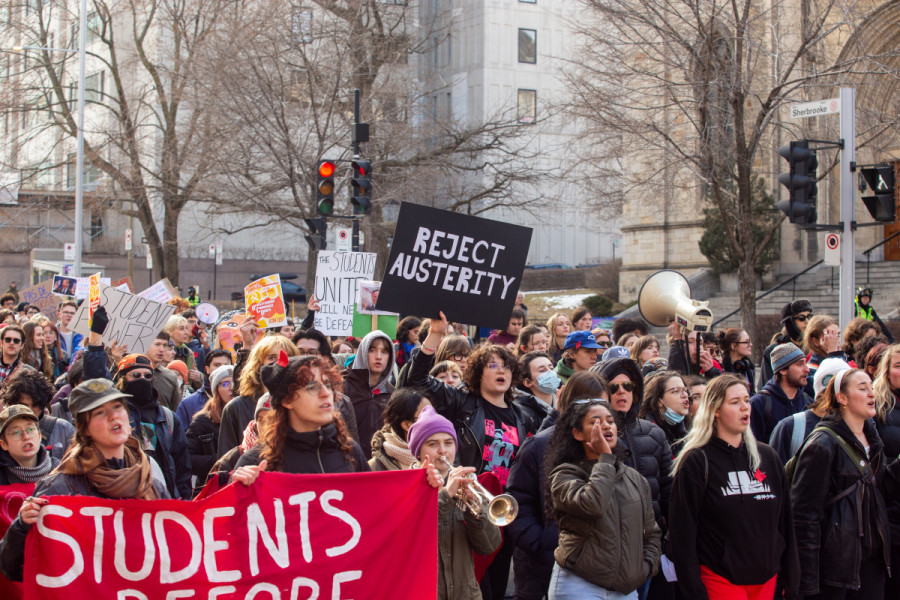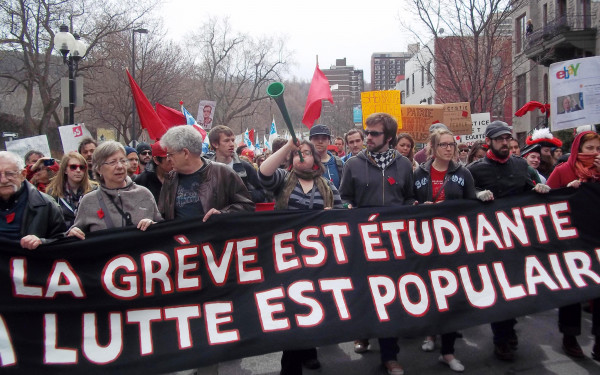Editorial: We got a bone to pick with tuition strike scabs
In October 2023, Quebec Premier François Legault and Minister of Higher Education Pascale Déry announced out-of-province and international students attending anglophone universities would have to pay significantly higher tuition.
Enraged by the government’s austerity, disregard for anglophone students and racially charged political decisions, students took matters into their own hands for the second time in the academic year. Student associations held general assemblies and asked students to vote on their departments going on strike.
From March 11 to March 15, over 22,000 students at Concordia University went on strike. Throughout the week, students were mobilized, picketed classrooms and protested in front of Legault’s Montreal office.
Although hundreds of students were on the front line enforcing the strikes, dozens of professors and students who wished to attend their classes crossed the picket line. During several instances, striking students were verbally and physically harassed as well as having security called on them by students and professors who refused to stand in solidarity.
A few talking points that often arose as students picketed were “This isn’t going to change anything,” or “I’m here to take my class and graduate, I don't care about anything else.”
Herein lies the problem. Students and professors are neglecting how damaging these increases will be to everyone, not only future students at Concordia. Approaching bureaucratic attacks on education in a hyper-individualized manner will never solve our problems.
Community action has led to so many positive changes in Quebec society, and tuition is a prime example. One of the only reasons Quebec has some of the lowest university tuition rates across Canada is due to students actively speaking out, striking and holding the provincial government accountable.
We are already seeing the signs of a bleaker university space. Classes are being cut and enrollment is down by 27 per cent. This means that crucial student-run services will have to either shut down or find ways to survive on a reduced budget, which comes directly from student fees. Services like the Advocacy Centre, the Legal Information Clinic, The Link, the People’s Potato, Le Frigo Vert, and many more.
The university’s administration has also not been accommodating. Instead of trying to help students, the administration has done everything in its power to sabotage picketers. According to university employees who spoke to The Link under anonymity, Concordia sent out emails to the chairs of each department, demanding professors not cancel class. Due to these emails, a number of professors still held class in person or tried to move them online. This led to a number of professors scabbing.
If the university administration actually cared for its students and their academic integrity, it would allow professors to cancel classes in solidarity.
Concordia is not blind to the government’s anti-anglophone and anti-immigrant agenda. While reminding professors not to cancel classes, Concordia is in the midst of suing the government for the tuition hikes.
On Feb. 23, Concordia President Graham Carr announced that the university is set to take legal action against the province. This is after months of discussions between the university and the government. Carr cited reasons such as “equality among francophone and anglophone linguistic groups and the protection of Quebec's minority English-language community,” per his statement.
Although The Link supports the university’s decision, we encourage the administration to use a more student-centric approach and not view the university strictly as a business.
The Link condemns all students and professors who broke pickets and harassed students.
No class is worth harassing those fighting for collective justice.
The government’s decision to price-gouge out-of-province and international students shouldn’t be tolerated, especially under the pretence of “protecting French.” If that was the government’s main concern, it would allow international students from non-European French-speaking countries to pay lower fees, like their French, Belgian and Swiss counterparts. The fight for accessible education requires everyone’s support.
This article originally appeared in Volume 44, Issue 12, published March 19, 2024.





_600_375_s_c1.png)

